I have a web-based system that reads a sheet of an excel file (each sheet uploaded is 6 rows-5 columns) like this:

Below is the code I'm using (for demonstration purposes I've set static values for the $entry but its real code would be for example $entry1=$objTpl->getActiveSheet()->getCell('A2')->getValue();
$con=mysqli_connect("localhost","root","","view");
if(isset($_POST['submit']))
{
$entry1 = 1;
$entry2 = 2;
$entry3 = 3;
$entry4 = 4;
$entry5 = 5;
$entry6 = 1;
$entry7 = 2;
$entry8 = 0;
$entry9 = 4;
$entry10 = 0;
$entry11 = 0;
$entry12 = 2;
$entry13 = 3;
$entry14 = 4;
$entry15 = 0;
$entry16 = 1;
$entry17 = 2;
$entry18 = 0;
$entry19 = 0;
$entry20 = 5;
$entry21 = 1;
$entry22 = 0;
$entry23 = 3;
$entry24 = 0;
$entry25 = 5;
if($entry1 != 0 || !empty($entry1))
{
mysqli_query($con,"INSERT INTO viewer(base_id,name,value) VALUES('1','entry1','$entry1')");
}
if($entry2 != 0 || !empty($entry2))
{
mysqli_query($con,"INSERT INTO viewer(base_id,name,value) VALUES('1','entry2','$entry2')");
}
if($entry3 != 0 || !empty($entry3))
{
mysqli_query($con,"INSERT INTO viewer(base_id,name,value) VALUES('1','entry3','$entry3')");
}
if($entry4 != 0 || !empty($entry4))
{
mysqli_query($con,"INSERT INTO viewer(base_id,name,value) VALUES('1','entry4','$entry4')");
}
if($entry5 != 0 || !empty($entry5))
{
mysqli_query($con,"INSERT INTO viewer(base_id,name,value) VALUES('1','entry5','$entry5')");
}
if($entry6 != 0 || !empty($entry6))
{
mysqli_query($con,"INSERT INTO viewer(base_id,name,value) VALUES('1','entry6','$entry6')");
}
if($entry7 != 0 || !empty($entry7))
{
mysqli_query($con,"INSERT INTO viewer(base_id,name,value) VALUES('1','entry7','$entry7')");
}
if($entry8 != 0 || !empty($entry8))
{
mysqli_query($con,"INSERT INTO viewer(base_id,name,value) VALUES('1','entry8','$entry8')");
}
if($entry9 != 0 || !empty($entry9))
{
mysqli_query($con,"INSERT INTO viewer(base_id,name,value) VALUES('1','entry9','$entry9')");
}
if($entry10 != 0 || !empty($entry10))
{
mysqli_query($con,"INSERT INTO viewer(base_id,name,value) VALUES('1','entry10','$entry10')");
}
if($entry11 != 0 || !empty($entry11))
{
mysqli_query($con,"INSERT INTO viewer(base_id,name,value) VALUES('1','entry11','$entry11')");
}
if($entry12 != 0 || !empty($entry12))
{
mysqli_query($con,"INSERT INTO viewer(base_id,name,value) VALUES('1','entry12','$entry12')");
}
if($entry13 != 0 || !empty($entry13))
{
mysqli_query($con,"INSERT INTO viewer(base_id,name,value) VALUES('1','entry13','$entry13')");
}
if($entry14 != 0 || !empty($entry14))
{
mysqli_query($con,"INSERT INTO viewer(base_id,name,value) VALUES('1','entry14','$entry14')");
}
if($entry15 != 0 || !empty($entry15))
{
mysqli_query($con,"INSERT INTO viewer(base_id,name,value) VALUES('1','entry15','$entry15')");
}
if($entry16 != 0 || !empty($entry16))
{
mysqli_query($con,"INSERT INTO viewer(base_id,name,value) VALUES('1','entry16','$entry16')");
}
if($entry17 != 0 || !empty($entry17))
{
mysqli_query($con,"INSERT INTO viewer(base_id,name,value) VALUES('1','entry17','$entry17')");
}
if($entry18 != 0 || !empty($entry18))
{
mysqli_query($con,"INSERT INTO viewer(base_id,name,value) VALUES('1','entry18','$entry18')");
}
if($entry19 != 0 || !empty($entry19))
{
mysqli_query($con,"INSERT INTO viewer(base_id,name,value) VALUES('1','entry19','$entry19')");
}
if($entry20 != 0 || !empty($entry20))
{
mysqli_query($con,"INSERT INTO viewer(base_id,name,value) VALUES('1','entry20','$entry20')");
}
if($entry21 != 0 || !empty($entry21))
{
mysqli_query($con,"INSERT INTO viewer(base_id,name,value) VALUES('1','entry21','$entry21')");
}
if($entry22 != 0 || !empty($entry22))
{
mysqli_query($con,"INSERT INTO viewer(base_id,name,value) VALUES('1','entry22','$entry22')");
}
if($entry23 != 0 || !empty($entry23))
{
mysqli_query($con,"INSERT INTO viewer(base_id,name,value) VALUES('1','entry23','$entry23')");
}
if($entry24 != 0 || !empty($entry24))
{
mysqli_query($con,"INSERT INTO viewer(base_id,name,value) VALUES('1','entry24','$entry24')");
}
if($entry25 != 0 || !empty($entry25))
{
mysqli_query($con,"INSERT INTO viewer(base_id,name,value) VALUES('1','entry25','$entry25')");
}
}
?>
I do have a couple of questions:
- Would it be possible to have all of these statements into one?
- Are there any significant performance changes when doing one big query rather than multiple ones?